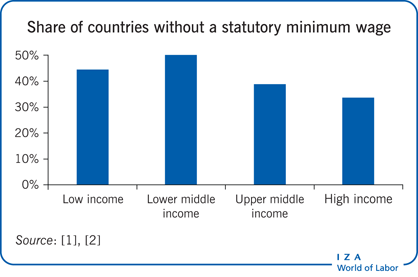Elevator pitch
Motivations for introducing a statutory minimum wage in developing countries include reducing poverty, advancing social justice, and accelerating growth. Attaining these goals depends on the national context and policy choices. Institutional capacity tends to be limited, so institutional arrangements must be adapted. Nevertheless, a statutory minimum wage could help developing countries advance their development objectives, even where enforcement capacity is weak and informality is pervasive.

Key findings
Pros
There is often public demand for a statutory minimum wage, providing political cover for implementing it.
The prevalence of market frictions and monopsony power in developing countries means that the conditions under which minimum wages can increase employment often hold.
Minimum wages can protect workers with low bargaining power from exploitation.
Minimum wages can increase household income when the employment shifts to the informal sector are not large.
Institutional mechanisms can be developed and adapted for developing countries.
Cons
Other tools for poverty reduction can be more effective than a minimum wage.
Minimum wages can cost formal sector jobs and increase the size of the informal sector.
Political economy and analytical capacity concerns must be addressed in designing governance institutions.
Developing countries may be tempted to set initial minimum wages too high (at levels that reduce total employment) relative to the productive structures of their economy.
Enforcement, coverage, and complexity are major problems for institutional design in developing countries.